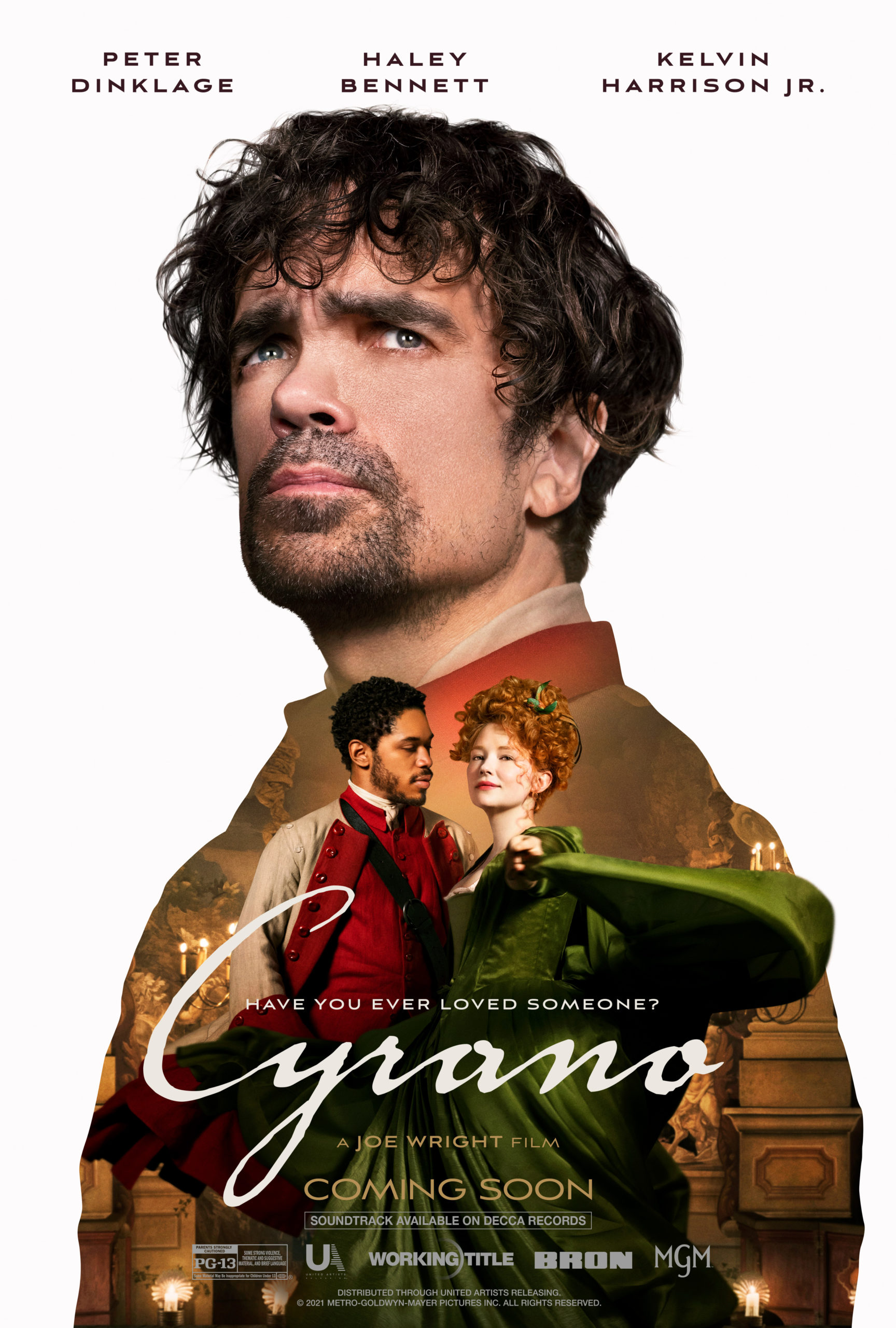Cyrano
Cyrano, 2021, 3 stars
A nose for a good story
Wright rewrites another literary classic
 Exclusive to MeierMovies, January 29, 2022
Exclusive to MeierMovies, January 29, 2022
Any heterosexual man who hasn’t felt ugly before a lovely woman is probably a sociopath. Whether you’re Brad Pitt or Quasimodo, we’re all damaged goods in the face of feminine beauty.
And so it is and always will be for Edmond Rostand’s Cyrano de Bergerac. He might not be as disadvantaged as the aforementioned Hunchback – indeed, he’s an accomplished poet, musician and swordsman – but he still feels inferior thanks to his proboscis. Fast-forward 95 years to Radiohead, and Roxanne is a feather floating in a beautiful world while Cyrano is a creep.
Jump ahead another three decades and movie magician Joe Wright has reimagined another literary masterpiece, as he did with Anna Karenina and Pride & Prejudice. His wizardry has lost some of its power this time, but his reinterpretation of Rostand’s 1897 classic still deserves a longing gaze – for the art direction, cinematography, costumes and the chance to compare it to other cinematic interpretations, especially Michael Gordon’s 1950 adaptation starting Oscar-winner José Ferrer, Jean-Paul Rappeneau’s 1990 film starring Gérard Depardieu, and Fred Schepisi and Steve Martin’s 1987 modern take.
If you know Wright, it’s no surprise his Cyrano is the most beautiful, ambitious and creatively filmed. What might surprise you, though – if you’re not familiar with Erica Schmidt’s 2018 stage musical, which is the basis for the film – is the clever reimagining of the title character.
“You always see a well-respected actor, usually a very attractive man, put on a big fake nose,” Schmidt told Tyler Coates of The Hollywood Reporter. “[The actor] spends the majority of the play talking about how hideous his nose is, but at the end of the day he takes the nose off and goes home.”
What if her adaptation – with music by Aaron and Bryce Dessner and lyrics by Matt Berninger and Carin Besser – swapped the schnoz for something that couldn’t be removed, while simultaneously bolstering the cinematic representation of little people? It’s an idea that both Schmidt and Wright apparently fell in love with. And that love turned familial once Peter Dinklage (Schmidt’s husband) and Haley Bennett (Wright’s girlfriend) were cast in both the stage production and the subsequent film, for which Schmidt penned the screenplay.
So what could go wrong? In short: music and casting (but not the casting you might think). The majority of the tunes are simply forgettable, with the notable exceptions of “Overcome” and “Wherever I Fall.” Those two showstoppers come nearly halfway through the film and toward the end, respectively, which means the movie meanders musically for a while. Predictably, and with help from Wright’s astonishing sense of visual storytelling, the tale eventually comes to life. But considering that 2021 was one of the strongest years for movie musicals since the 1960s, Cyrano’s tunes aren’t particularly memorable, especially when competing against West Side Story. It’s also worth noting that Rostand’s play has been adapted into stage musicals many times, including in 1973 by Anthony Burgess and Michael Lewis, with Christopher Plummer winning a Tony for best actor. Though those musical versions have, by and large, not made it to the silver screen, their theatrical presence robs Wright’s film of some of its wow factor.
The movie’s music and story are buoyed by Bennett, whose countenance and voice are like cotton candy. (I now have a sugar addiction.) Dinklage is simply competent, however, with his best feature being his expressive face, especially his sad eyes. But circling back to that aforementioned casting mistake, Wright has picked Kelvin Harrison Jr. (It Comes at Night, Waves) as Christian. The selection of Harrison, who is Black, is one of the worst colorblind-casting decisions in recent memory. I’m not opposed to so-called integrated or non-traditional casting in general. Theatre has had success with it for centuries (sometimes for the wrong reasons), and the cinema has used it effectively too, occasionally. (Joel Coen’s The Tragedy of Macbeth comes to mind, as do most Shakespeare productions and countless stories for which a character’s race or ethnicity is immaterial.) But because Cyrano is a story that specifically asks its audience to pay attention to physical appearances, placing a Black actor in a role written for (and historically influenced by) a White man represents an extraordinary lapse in judgment.
“The world will never accept a midget and a tall, beautiful woman,” Cyrano says. Yet, apparently, 17th-century France will accept a tall, beautiful (and rich) woman and a Black man? It is, of course, the Black man and not the little person who would have more difficulty with that situation. So I found myself often rooting for Christian, not just because of the ethnic and social implications of the reimagined character (he is also poor) but because Harrison is just too darn likeable. Because this is a musical fantasy and contains some anachronistic elements, I was able to mostly overlook the ridiculous size disadvantage Dinklage faced during the fight scenes, but I could not get past the fact that I didn’t know whether to root for Christian or Cyrano.
If you think my argument too conservative, don’t forget that the casting has upset many liberals too. Christian, who is traditionally White and, frankly, dumb, has been replaced by a Black actor. This sets up an awkward dichotomy in which the inexpressive Black man must rely entirely on the brilliant White man to speak for him. In this respect, Christian is one of the last Caucasian characters in all literature whom a director should cast as Black.
So, like Cyrano himself, the film’s surface flaws are obvious but are overwhelmed by panache and inner beauty.
© 2022 MeierMovies, LLC
For more information about the movie, visit IMDB and Wikipedia.